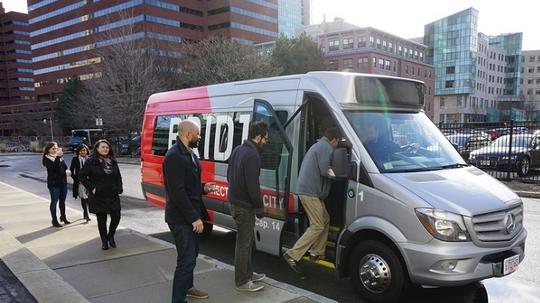

RideScout's acquisition of GlobeSherpa, announced Tuesday, was another sign of ever-growing interest in applying mobile technology to make transit easier in the U.S. Arguably nowhere else is that more true than in Washington, D.C., where startups have created an ecosystem of transportation options and solutions.
RideScout itself is a good example. The transportation option aggregator may be based in Austin, but it's had a presence in D.C. from day one, inspired by transportation issues in the area. The app launched in the District before anywhere else and RideScout still maintains a presence with a team of four based out of the 1776 tech incubator.
"People want transit to be more efficient," said RideScout CEO Joseph Kopser. "That's why the transportation landscape is getting more crowded."
GlobeSherpa will maintain its own brand, but its booking and payment technology will start to be integrated into RideScout's own offerings, which at the moment include mobile ticketing for some of Austin's public transportation. GlobeSherpa isn't a stranger to the D.C. area, though. Virginia Rail Expressway picked GlobeSherpa as its mobile ticket provider in May.
That deal is itself is a recognition of how much interest and attention there is on better mobile transit tools in the area. Companies have opened up plenty of new options just in the last year; picking D.C. as the destination for early expansion and even piloting ideas that may apply nationally or globally.
The trend is about making all mass transit seamless.
For instance, there's Bridj, which picked D.C. as the first place to expand its "Uber for buses" commuting service after launching in Boston. Bridj basically provides a private mini-bus along routes determined by a combination of user votes and data analysis of where people are and where they want to go, adapting news routes over time as new data comes in.
Then there's the carpooling by app option. New startup Split launched in D.C. in part because the city has the kind of demand for transit options that offer new companies a chance to try out their ideas for solving transportation problems.
In Split's case, that means on-demand rides that also include stopping to pick up other people. Though that can extend the transit time, it lowers the price while still having the on-demand convenience. And Split is only the latest option for sharing carpools. Sidecar was one of the first ride-hailing apps to try out the model and Uber and Lyft both have their own shared carpool systems.
That's all part of the evolution of transportation, according to Kopser. But even hotbeds of transit tech like D.C. don't have every angle covered.
"The trend about more than just public transit," Kopser said. "There are entire modes of transportation that don't have solutions yet."
That helped motivate the purchase of GlobeSherpa. Combined with RideScout's own features, the app will soon offer faster and easier ways for users to find transportation methods and pay for them, adapting to changing locations and times. And the services can use RideScout's data analysis tools to improve things on their end as well, whether it's a city trolley or van-sharing app. However the scene evolves, D.C. and the companies operating in the area will be a weathervane for what's to come.
"The trend is about making all mass transit seamless," Kopser said.




